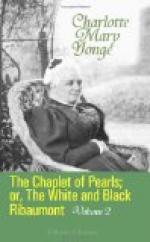The royal one of course Berenger could not love, but the rigid bareness, and, as he thought, irreverence of the Calvinist, and the want of all forms, jarred upon one used to a ritual which retained much of the ancient form. In the early years of Elizabeth, every possible diversity prevailed in parish churches, according to the predilections of rector and squire; from forms scarcely altered from those of old times, down to the baldest, rudest neglect of all rites; and Berenger, in his country home, had been used to the first extreme. He could not believe that what he heard and saw among the Sacrementaires, as they were called, was what his father had prized; and he greatly scandalized Sidney, the pupil of Hubert Languet, by openly expressing his distaste and dismay when he found their worship viewed by both Walsingham and Sidney as a model to which the English Protestants ought to be brought.
However, Sidney excused all this as more boyish distaste to sermons and love of externals, and Berenger himself reflected little on the subject. The aspect of the venerable Coligny, his father’s friend, did far more towards making him a Huguenot than any discussion of doctrine. The good old Admiral received him affectionately, and talked to him warmly of his father, and the grave, noble countenance and kind manner won his heart. Great projects were on foot, and were much relished by the young King, for raising an army and striking a blow at Spain by aiding the Reformed in the Netherlands; and Coligny was as ardent as a youth in the cause, hoping at once




